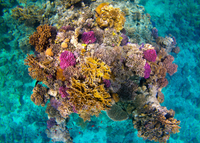Could probiotics ‘save the bees’ and protect the Great Barrier Reef from climate change?
From coral reefs to honey bees, it’s undeniable that human activity is threatening the health and wellness of many organisms that play a critical role in sustaining our planet’s ecosystems. Our impact on the earth is so profound and massive that scientists are proposing a new geological epoch—the Anthropocene, defined by signals like radioactive elements from nuclear bomb tests, plastic pollution, soot from power stations, concrete, and bones (and future fossils) left by the global proliferation of domestic chickens.
Seed Health, a microbiome science company pioneering innovations in probiotics and living medicines to impact human and planetary health, is on a mission to recover these impacted ecosystems. With the belief that health is not just human, they founded SeedLabs, their ecological research division, to develop novel applications of bacteria to enhance biodiversity and recover ecosystems impacted by human activity. Led by co-founder and co-CEO Raja Dhir, the program is working to solve some of the biggest challenges facing our collective home.
Here are some of the ways Dhir and the team at Seed Health are collaborating with leading scientists and research partners from around the globe to pioneer innovations in probiotics to help save the natural world...
1. Improving honey bee (A. mellifera) immune resilience with probiotics
 Photo by Boba Jaglicic on UnsplashHoney bees, one of our most vital insect pollinators, are responsible for nearly a third of our global food crops. Over the past decade, widespread pesticide use, along with climate change, disease, and habitat loss, have contributed to a stark reduction in honey bee populations.
Photo by Boba Jaglicic on UnsplashHoney bees, one of our most vital insect pollinators, are responsible for nearly a third of our global food crops. Over the past decade, widespread pesticide use, along with climate change, disease, and habitat loss, have contributed to a stark reduction in honey bee populations.
In collaboration with Seed Health scientific board member, Dr. Gregor Reid and SeedLabs fellow, Brendan Daisley, the team identified three probiotic strains—Lactobacillus plantarum Lp39, Lactobacillus rhamnosus GR-1, and Lactobacillus kunkeei BR-1—with the potential to improve honey bee immune resilience. As a result, they developed the award-winning BioPatty™, formulated with these three probiotic strains and delivered it to A. mellifera hives.
Early results are promising, revealing that hives administered the BioPatty™ showed a significantly lower pathogen load in both adult bees and in larvae than those without. Initial field trial observations were then reproduced in laboratory experiments, indicating that the three-strain probiotic could improve honey bee survival against Paenibacillus larvae infection, directly inhibit P. larvae cells in vitro, and modulate innate immunity when an infection was experimentally triggered.
2. Increasing the resilience of coral reefs by advancing breakthrough research Photo by Veronica Reverse on Unsplash
Photo by Veronica Reverse on Unsplash
In a breakthrough study published in Science Advances, research has shown that Beneficial Microorganisms for Corals (BMCs) can help corals recover from thermal stress in a number of ways, chiefly by stimulating immune processes that help them rebuild their microbiome environment and offset post-heat stress disorder (PHSD) symptoms driven by thermal stress. The study, which centered on Mussismilia hispida after being exposed to bleaching conditions and inoculated with BMCs, showed a 40 percent increase in survival rates compared to coral evaluated in the control group. In other words, probiotics can buy corals time to recover so that algae will stay for a longer period of time, or more quickly return after a bleaching event. Probiotic “medicine” can even protect bleached corals from death.
Together with Dr. Raquel Peixoto, an associate professor of Marine Science at King Abdullah University of Science and Technology (KAUST), and along with Helena Villela, the newest SeedLabs fellow, the team is advancing this breakthrough research to develop next-generation probiotics for the prevention of coral bleaching, enhancing coral calcification, and aiding in coral growth and resilience.
But the ocean poses a challenge for probiotic delivery—unlike a tank, the environment cannot be stabilized to allow for simple microbial delivery to the reef. As such, they are also developing novel delivery technologies for probiotic delivery to reef systems, with the potential to rescue corals from thermal stress.
"Home to more than 25 percent of marine life, coral reefs are one of the most biodiverse ecosystems on our planet and play an important role in the health of millions of species, including humans. Rising ocean temperatures and acidification due to greenhouse gas emissions have put coral reefs at risk of worldwide collapse within the next decade," said Dhir. "Our SeedLabs initiatives reflect our commitment to pioneer probiotic innovations that can rescue and regenerate these critical ecologies impacted by human-induced climate change."
As of now, field testing has begun in the Red Sea and additional collaborations are underway to expand testing to other sites, metagenomic sequencing, and delivery technology testing.
And Seed Health is just getting started. In addition to the initiatives above, they are currently working on future applications of microbes to help save the planet—for agriculture, space, and more.

